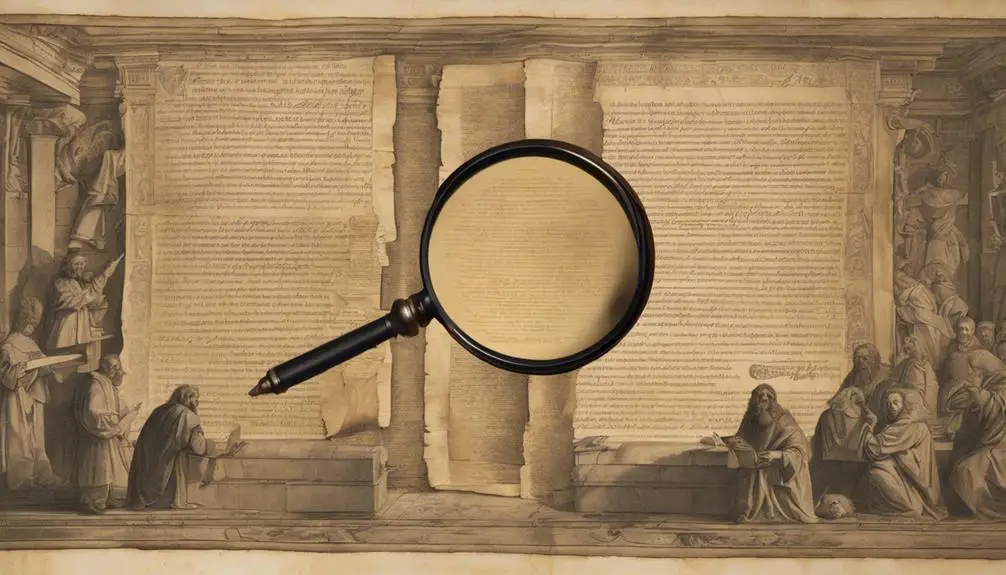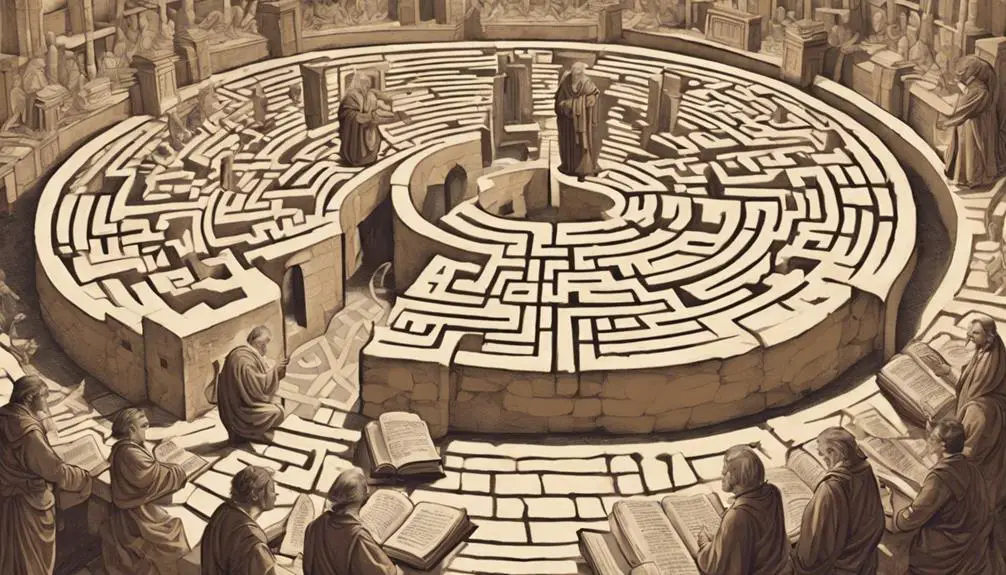Wrestle with the intriguing inconsistencies and apparent loopholes in the Bible, sparking debates about interpretation and context.

Loopholes in the Bible
You've probably heard the saying, 'The devil is in the details,' and when it comes to the Bible, this adage often rings true.
As you explore this sacred text, you may notice apparent contradictions or 'loopholes' that seem to blur its moral and legal guidelines. Scholars and theologians have wrestled with these inconsistencies for centuries, sparking fascinating debates about interpretation and context.
Intrigued yet? There's a wealth of insight waiting for you just below the surface.
Key Takeaways
- Biblical loopholes, influenced by historical context, introduce complexity and adaptability to scriptures interpretation.
- Notable biblical figures like Jesus and Apostle Paul exploited loopholes, promoting inclusive and compassionate theology.
- Modern interpretations of biblical loopholes stir debates on issues like the death penalty, homosexuality, and women's rights.
- Understanding cultural and historical context aids in interpreting apparent contradictions and exploiting biblical loopholes effectively.
Controversial Contradictions in Scripture

Diving deep into the biblical text, you'll often find controversial contradictions that have sparked debates among scholars and theologians for centuries. These contradictions challenge notions of Scriptural Infallibility, raising questions about the absolute consistency of the biblical record.
For example, you'll notice discrepancies in the synoptic gospel accounts of Jesus' resurrection. Matthew's account differs significantly from Mark's, leading to uncertainty about the specifics of this seminal event. This isn't to undermine the scriptures, but rather to highlight that they were written by human authors with different perspectives.
This has led to Religious Skepticism, with critics arguing that these contradictions cast doubt on the Bible's divine authority. Some have even suggested that these inconsistencies make the Bible unreliable as a moral guide. However, proponents of Scriptural Infallibility argue that such contradictions are superficial and don't affect the core messages of the scriptures.
Your exploration of these contradictions, therefore, shouldn't lead to dismissal of the biblical text, but rather to a nuanced understanding of it. It's crucial to remember that interpreting the Bible requires careful scholarship, not just literal reading. Understanding the cultural, historical, and linguistic contexts of the scriptures aids in unraveling their complexities.
The Concept of Biblical Loopholes

Beyond grappling with these controversial contradictions, you might also consider the intriguing concept of biblical loopholes, which introduces another layer of complexity to our understanding of the scriptures. These scriptural ambiguities, often termed as 'Divine Loopholes', can be seen as instances where the scripture seems to allow for exceptions to its own rules or principles.
These Divine Loopholes aren't without significance. They can influence religious practice, moral decisions, and even legal frameworks. For instance, certain biblical laws that seem absolute may, under specific circumstances, be bypassed without violating their core principles. This possibility allows for a dynamic interpretation of the scripture, fostering flexibility within religious and ethical frameworks.
In analyzing these loopholes, you're not undermining the sanctity of the scriptures. Rather, you're exploring the nuanced layers of its teachings. Understanding these Divine Loopholes requires wisdom, discernment, and a deep familiarity with the text. It's not about exploiting gaps in the scripture, but about illuminating its depth and adaptability.
In your study, remember this: these scriptural ambiguities don't weaken the Bible's authority. They instead reveal its sophisticated depth, the ability to address complex realities, and its enduring relevance in a changing world.
Historical Context of Biblical Laws

To fully comprehend the intricacies of biblical laws, it's crucial to delve into their historical context, as it provides essential insights into their intended meaning and application. You must appreciate that these laws were codified in a time far removed from our present realities, shaped by ancient jurisprudence and societal norms that differ greatly from those of today.
Biblical laws weren't formulated in a vacuum; they were influenced by the legal systems of neighboring civilizations, like the Babylonians and the Hittites. The understanding of these laws is profoundly shaped by the context of the Ancient Near East, which was the cradle of human civilization and law.
Furthermore, the subtleties of biblical texts often get lost in translation, leading to potential misinterpretations of biblical laws. Variations in biblical translations can alter the meanings of laws, sometimes significantly. For instance, the Hebrew Bible, which is the source of the Old Testament, contains linguistic nuances that are challenging to convey accurately in other languages. Hence, it's imperative to consider these aspects when interpreting biblical laws.
This understanding, therefore, provides a more nuanced view of biblical laws, and their perceived loopholes, in light of their historical context.
Notable Figures Exploiting Loopholes

Turning our attention to specific instances, we can identify notable figures who've exploited these perceived loopholes in biblical laws.
Jesus' interpretation of the Mosaic law is an excellent example. Often, He sidestepped rigid interpretations of the law, opting for a more merciful and inclusive application. For instance, Jesus healed on the Sabbath, an act considered work and therefore a transgression by strict Jewish law. However, Jesus justified this by arguing that doing good, even on the Sabbath, wasn't a violation but an affirmation of God's law.
Then there's the Apostle Paul, whose adaptations of the law played a significant role in shaping Christian theology. Paul was instrumental in transitioning the early church from a sect of Judaism into an independent religion. He did this by exploiting a perceived loophole in the law, arguing that faith in Jesus Christ superseded the need for strict adherence to the Mosaic law.
As you can see, both figures leveraged these perceived loopholes in order to redefine the application of the laws and to promote a more inclusive, compassionate interpretation. Their actions and teachings, controversial as they might've been, have had a lasting impact on Christian theology.
Theological Debates Over Interpretation

In the realm of theology, you'll find that debates over biblical interpretation, especially concerning perceived loopholes, often hinge on the intersection of historical context, linguistic nuance, and personal conviction. Canon Discrepancies and Textual Ambiguities are two significant factors that fuel these theological debates.
Canon Discrepancies refer to discordances within the accepted biblical canon itself. You'll notice that the same event may be described differently in various books, causing confusion and sparking debate. For example, the number of angels present at Jesus's tomb is a common discrepancy in the four Gospels.
Textual Ambiguities, on the other hand, arise from the fact that the Bible's original texts were written in languages, such as ancient Hebrew and Greek, that are far removed from today's vernacular. Translations, therefore, may not fully capture the subtleties of these languages, leading to potential misinterpretations.
In essence, the combination of Canon Discrepancies and Textual Ambiguities creates a fertile ground for theological debates. As you navigate these debates, remember that exploring these complexities can deepen your understanding of the Bible and its teachings, rather than undermining your faith.
Biblical Loopholes in Modern Times

Shifting our focus to modern times, you'll find that biblical loopholes continue to stir substantial debate, often challenging long-held interpretations and shaping contemporary discourse. Modern ethics and biblical misinterpretations intersect in fascinating ways, creating a landscape ripe for exploration and discussion.
Consider, for instance, the issues surrounding the death penalty, homosexuality, and women's rights. The Bible has been used to argue both for and against these contentious issues, creating a complex web of interpretations.
To illustrate, consider the following table:
Issue |
Biblical Reference |
Common Misinterpretation |
|---|---|---|
Death Penalty |
Genesis 9:6 |
'An eye for an eye' is often misinterpreted as an endorsement of capital punishment |
Homosexuality |
Leviticus 18:22 |
This verse is often used against homosexuality, despite cultural and historical context |
Women's Rights |
1 Timothy 2:12 |
This verse is often used to limit women's roles in the church, overlooking its historical context |
In each case, modern ethics challenge traditional interpretations, demanding a reevaluation of long-held beliefs. It's crucial to approach these loopholes with an open mind and a dedication to scholarly analysis. You'll find that in doing so, you not only gain a deeper understanding of the Bible, but also of our evolving societal norms.
Reconciliation of Apparent Contradictions

Countless apparent contradictions in the Bible have puzzled readers for centuries, yet careful study often reveals harmonious explanations that reconcile these seeming inconsistencies. This process, known as Contradiction Analysis, isn't merely an apologetic exercise, but an investigative tool that deepens your understanding of the text.
Consider the Scriptural Paradoxes, where two seemingly contradictory truths coexist. For instance, God's sovereignty and human free will. These aren't contradictions, but complementary truths that underline the complexity of divine wisdom. You're invited to embrace this paradox, not as a loophole, but as a revelation of God's multifaceted nature.
When contradictions appear to exist, consider cultural, historical, and linguistic contexts. Often, what initially seems contradictory is a matter of perspective. For example, the differing genealogies of Jesus in Matthew and Luke can be reconciled by understanding the purpose of each writer. Matthew, writing for a Jewish audience, traces the legal lineage through Joseph, while Luke, writing for Gentiles, tracks the biological lineage through Mary.
Frequently Asked Questions
What Are Some Examples of Seeming Inconsistencies in the Bible That Are Not Necessarily Contradictions?
You might note discrepancies in the Bible's Creation accounts or paradoxes in prophecy. For instance, Genesis offers two differing sequences of Creation. In prophecy, God's foreknowledge seems to contradict human free will.
These aren't necessarily contradictions, but could be viewed as different perspectives or metaphorical interpretations. It's important to approach with analytical rigor, understanding the Bible's historical and cultural context.
Are There Any Biblical Laws That Were Created Specifically to Close Certain Loopholes?
You're asking if there are any biblical laws created to address certain 'divine loopholes.'
While it's difficult to pinpoint specific laws, one could argue that numerous commandments and tenets were instituted to clarify 'biblical ambiguities.'
These laws and instructions often provide explicit guidance where earlier texts may have left room for interpretation, thus serving to 'close' potential loopholes or inconsistencies.
Which Notable Figures in the Bible Are Known to Have Exploited Loopholes for Their Advantage?
You're asking about notable figures exploiting loopholes, a form of 'Divine Trickery'.
Jacob's deception of his father Isaac to obtain Esau's birthright in Genesis is an instance of 'Biblical Exploitations'.
Another example is Tamar's ruse to secure her rights as a widow in Genesis.
These examples highlight the complex morality within biblical narratives, showing figures using cunning to overcome obstacles, often with divine approval.
How Do Theological Scholars Commonly Interpret Supposed Loopholes in the Bible?
You're exploring how theological scholars interpret supposed inconsistencies, aren't you? Typically, they attribute these to 'Divine Ambiguity', a concept suggesting God's messages are intentionally vague to encourage deeper understanding.
This results in 'Interpretation Variance', where scholars have different readings. They don't see these as loopholes, but as opportunities for diverse theological discourse.
The scholars' aim isn't to exploit gaps, but to fully comprehend God's word.
How Have Interpretations of Biblical Loopholes Evolved Over Time and Impacted Modern Societal Norms?
You've noticed that interpretations of biblical loopholes, particularly in literature, have evolved and shaped modern societal norms.
This evolution of religious practices reflects our changing understanding and application of these texts.
As society evolves, so too does our interpretation of these perceived loopholes, allowing for more nuanced and progressive views to emerge.
It's a tangible demonstration of the dynamic relationship between religious texts and the societies they influence.
Conclusion
In conclusion, you've seen how the concept of biblical loopholes has sparked significant debate, both historically and in modern times. These apparent contradictions, whether exploited by notable figures or pondered by theologians, offer a complex layer to the interpretation of Biblical laws.
Remember, the historical context often illuminates these seeming inconsistencies. As you explore further, consider how reconciliation of these loopholes can deepen understanding and enrich faith.



Sign up